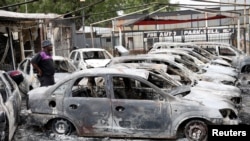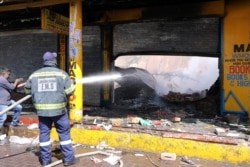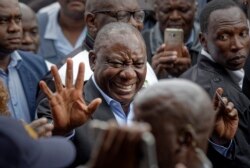Peter Clottey and Dawit Gelmo contributed to this report.
Zerihun Tabo, an Ethiopian shopkeeper, surveyed the wreckage of his neighborhood store in Johannesburg, South Africa, this week, after looters pillaged it.
"I can't even express what happened. It's so heavy. It's very difficult," he said.
Zerihun is one of dozens of victims of xenophobic attacks that have spread across the country in recent days, killing at least five and destroying the livelihoods of many more. In an interview with VOA's Amharic service, Zerihun pondered his future and that of other foreigners living in South Africa.
"I used to sell bottles in my store, but I have no hope in this country," he said, "after working hard and building something for so many years and losing it all at once. It's ugly."
Attacks against foreigners in South Africa are not new. According to the website Xenowatch, which tracks such incidents, more than 500 attacks occurred between 1994 and 2018. The attacks seem to spike periodically; more than 100 attacks in 2008 left more than 60 people dead, and more than 70 attacks occurred in 2015. This year is on track to be another violent one, with more than 40 incidents recorded. More than half of the incidents unfolded in Johannesburg, the country's largest city.
The roots of the anger against foreigners are difficult to pin down. South Africa is home to about 3.6 million foreign nationals who make up about 7% of the population. The majority — about 70% — come from the neighboring countries of Zimbabwe, Mozambique and Lesotho, the BBC reported.
Some politicians and officials have amplified the widely held belief that foreigners own an outsized share of businesses in the country, particularly in the poorer townships. At a press conference on Monday, South Africa's former deputy minister of police, Bongani Mkongi, claimed that residents of the Hillbrow neighborhood of Johannesburg are 80% foreign born.
"We cannot surrender South Africa to foreign nationals," he said. "That is a matter of principle. We fought for this country, not only for us, but for generations of South Africans."
The fact-checking website AfricaCheck examined his claim and found it to be false.
Anger against foreigners dates back decades, said Jean Pierre Misago, a researcher at the African Center for Migration and Society at the University of the Witwatersrand in Johannesburg. Because of the oppressive restrictions of apartheid, black people were forced to live in poor areas known as townships. When immigrants arrived and looked for business opportunities, they often found that these same townships were the only places where they could afford to open shops.
This bred anger and resentment. "They say, 'You are taking our business. You are undermining our businesses. We are now competing with you for scarce jobs and scarce resources. And we don't want that,'" Misago told VOA.
Political leaders unable to deliver services and jobs for their constituents often scapegoat immigrants.
"The government is not able to deliver basic services to those areas. And to justify their delivery failures, they blame those foreign nationals for delivery failures: 'If you don't find medicine in your clinic it is because of foreign nationals. There are too many and they are taking it and walking away from you,'" Misago said.
In response to the recent spate of attacks, some South African politicians are now seeking to cool the rhetoric. President Cyril Ramaphosa said there is no justification for the violence and convened security ministers to develop a response plan.
In an interview with VOA's Peter Clottey, Godrich Gardee, the general secretary of South Africa's Economic Freedom Fighters political party, said the killing of Africans by other Africans is unacceptable and must be punished.
"Africa was a borderless continent," Gardee said. "The borders were imposed [on] us by the imperialists and colonialists, and we shall continue to condemn that conduct by the communities against our fellow brothers and sisters from other parts of Africa."






